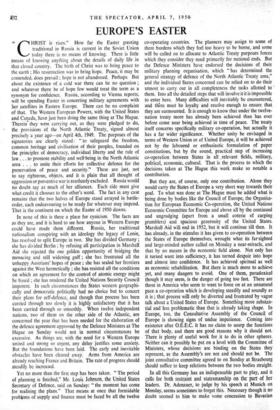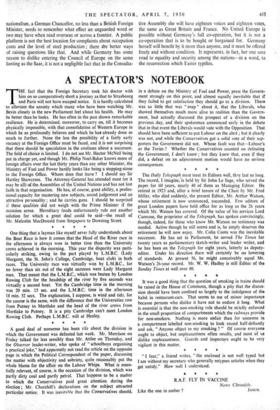EUROPE'S EASTER
C " HRIST is risen." How far the Easter greeting traditional in Russia is current in the Soviet Union today there is no means of knowing. There is little means of knowing anything about the details of daily life in that closed country. The birth of Christ was to bring peace to the earth ; His resurrection was to bring hope. Peace, it may be contended, does prevail ; hope is not abandoned. Perhaps. But about the existence of a cold war there can be no question ; and whatever there be of hope few would treat the term as a synonym for confidence. Russia, according to Vienna reports, will be spending Easter in concerting military agreements with her satellites in Eastern Europe. There can be no complaint of that. The Western European Powers, with the United States and Canada, have just been doing the same thing at The Hague. Therein they were carrying out, as they were pledged to do, the provisions of the North Atlantic Treaty, signed almost precisely a year ago—on April 4th, 1949. The purposes of the signatories are clearly stated: "to safeguard the freedom. common heritage and civilisation of their peoples, founded on the principles of democracy, individual liberty and the rule of law ... to promote stability and well-being in the North Atlantic area . ... to unite their efforts for collective defence for the preservation of peace and security." These are just, not to say righteous, objects, and it is plain that all thought of aggression or preventive war is resolutely excluded. Russia would no doubt say as much of her alliances. Each side must give what credit it chooses to the other's word. The fact in any case remains that the two halves of Europe stand arrayed in battle- order, each endeavouring to be ready for whatever may impend. That is the continent on which the Easter of 1950 dawns.
In none of this is there a place for cynicism. The facts are as they are, and it is hard to see how anyone in Western Europe could have made them different. Russia, her traditional nationalism conspiring with an ideology the legacy of Lenin, has resolved to split Europe in two. She has divided Germany ; she has divided Berlin ; by refusing all participation in Marshall Aid she rejected the one golden opportunity of bridging the menacing and still widening gulf ; she has frustrated all the unhappy Austrians' hopes of peace ; she has sealed her frontiers against the West hermetically ; she has resisted all the conditions on which an agreement for the control of atomic energy might be based ; she has rendered the United Nations Security Council impotent. In such circumstances the States western geographi- cally and democratic politically had no• choice but to concert their plans for self-defence, and though that process has been carried through too slowly it is highly satisfactory that it has been carried through so smoothly. When twelve independent nations, two of them on the other side of the Atlantic, are concerned the year that has been needed for the elaboration of the defence agreement approved by the Defence Ministers at The Hague on Sunday would not in normal circumstances be excessive. As things are, with the need for a Western Europe united and strong so urgent, any delay justifies some anxiety. But the foundations have been laid. The early and inevitable obstacles have been cleared away. Arms from America are already reaching France and Britain. The rate of progress should steadily be increased.
Yet no more than the first step has been taken. "The period of planning is finished," Mr. Louis Johnson, the United States Secretary of Defence, said on Sunday: "the moment has come for realising the plans." That means at once that formidable problems of supply and finance must be faced by all the twelve co-operating countries. The planners may assign to some of them burdens which they feel too heavy to be borne, and some will be called on to allocate to Atlantic Treaty purposes forces which they consider they need primarily for national ends. But the Defence Ministers have endorsed the decisions of their military planning organisation, which "has determined the general strategy of defence of the North Atlantic Treaty area," and the individual States concerned can be relied on to do their utmost to carry out in all completeness the tasks allotted to them. Into all the detailed steps that will involve it it is impossible to enter here. Many difficulties will inevitably be encountered, and there must be loyalty and resolve enough to ensure that they are surmounted. It is enough to know that under thetwelve- nation treaty more has already been achieved than has ever before come near being achieved in time of peace. The treaty itself concerns specifically military co-operation, but actually it has a far wider significance. Whether unity be envisaged in terms of Western Union or of United Europe, it will be achieved not by the laboured or enthusiastic formulation of paper constitutions, but by the sound, practical step of increasing co-operation between States in all . relevant fields, military, political, economic, cultural. That is the process to which the decisions taken at The Hague this week make so notable a contribution.
But they are, of course, only one contribution. Alone they would carry the States of Europe a very short way towards their goal. To what was done at The Hague must be added what is being done by bodies like the Council of Europe, the Organisa- tion for European Economic Co-operation, the United Nations Economic Committee for Europe and above all by the continued and ungrudging (apart from a small coterie of carping grumblers) and spacious generosity of the United States. Marshall Aid will end in 1952, but it will continue till then. It has already, in the stimulus it has given to co-operation between the States of Europe themselves, wrought what its farsighted and large-minded author called on Monday a near-miracle, and that by no means in the economic field alone. Not only has it turned want into sufficiency, it has turned despair into hope and almost into confidence. It has achieved spiritual as well as economic rehabilitation. But, there is much more to achieve yet, and -many dangers to avoid. One of them, paradoxical though it may seem, is the danger of going too fast. There are those in America who seem to want to force on at an unnatural pace a co-operation which is developing steadily and soundly as it is ; that process will only be diverted and frustrated by vague talk about a United States of Europe. Something more substan- tial and less problematic than that is already taking shape. In Europe, too, the Consultative Assembly of the Council of Europe is showing signs of undue impatience. Coming into existence after 0.E.E.C. it has no claim to usurp the functions of that body, and there are good reasons why it should not. There is plenty of useful work for it to do in other spheres. Neither can it possibly be put on a level with the Committee of Ministers, whose decisions are binding on the States they represent, as the Assembly's are not and should not be. The joint consultative committee agreed to on Sunday at Strasbourg should suffice to keep relations between the two bodies straight.
In all this Germany has an indispensable part to play, and it calls for both restraint and statesmanship on the part of her leaders. Dr. Adenauer, to judge by his speech at Munich on Monday, seems sometimes to forget this. Necessary though it no doubt seemed to him to make some concession to Bavarian
nationalism, a German Chancellor, no less than a British Foreign Minister, needs to remember what effect an unguarded word or two may have when read overseas or across a frontier. A public platform is not the best location for complaints about occupation costs and the level of steel production ; there ate better ways of raising questions like that. And while Germany has some reason to dislike entering the Council of Europe on the same footing as the Saar, it is not a negligible fact that in the Consulta- five Assembly she will have eighteen voices and eighteen votes, the same as Great Britain and France. No United Europe is possible without Germany's full co-operation, but it is not a co-operation that is to be bought or bargained for. Germany herself will benefit by it more than anyone, and it must be offered freely and without condition. It represents, in fact, her one sure road to equality and security among the nations—in a word, to the resurrection which Easter typifies.







































 Previous page
Previous page